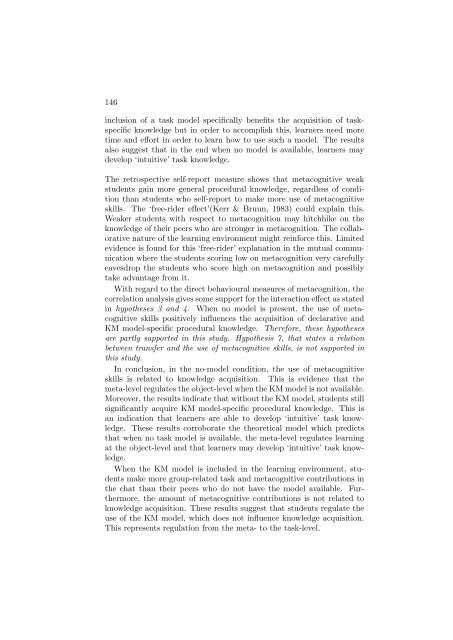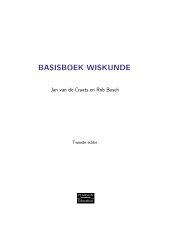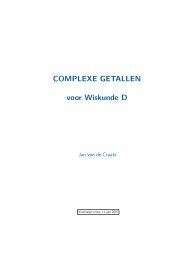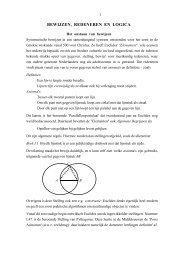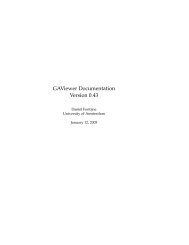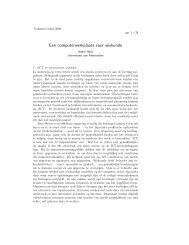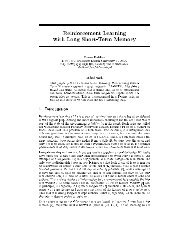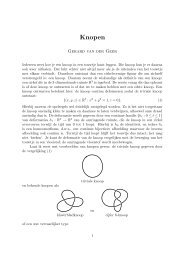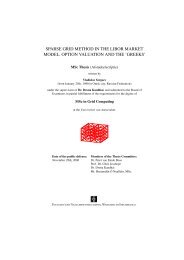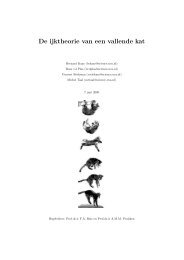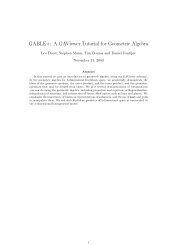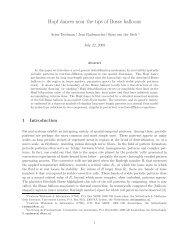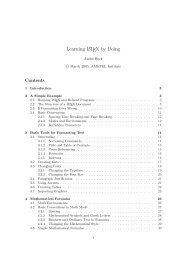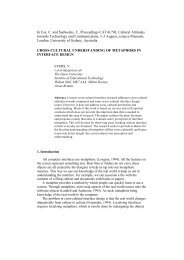The role of metacognitive skills in learning to solve problems
The role of metacognitive skills in learning to solve problems
The role of metacognitive skills in learning to solve problems
You also want an ePaper? Increase the reach of your titles
YUMPU automatically turns print PDFs into web optimized ePapers that Google loves.
146<br />
<strong>in</strong>clusion <strong>of</strong> a task model specifically benefits the acquisition <strong>of</strong> taskspecific<br />
knowledge but <strong>in</strong> order <strong>to</strong> accomplish this, learners need more<br />
time and effort <strong>in</strong> order <strong>to</strong> learn how <strong>to</strong> use such a model. <strong>The</strong> results<br />
also suggest that <strong>in</strong> the end when no model is available, learners may<br />
develop ‘<strong>in</strong>tuitive’ task knowledge.<br />
<strong>The</strong> retrospective self-report measure shows that <strong>metacognitive</strong> weak<br />
students ga<strong>in</strong> more general procedural knowledge, regardless <strong>of</strong> condition<br />
than students who self-report <strong>to</strong> make more use <strong>of</strong> <strong>metacognitive</strong><br />
<strong>skills</strong>. <strong>The</strong> ‘free-rider effect’(Kerr & Bruun, 1983) could expla<strong>in</strong> this.<br />
Weaker students with respect <strong>to</strong> metacognition may hitchhike on the<br />
knowledge <strong>of</strong> their peers who are stronger <strong>in</strong> metacognition. <strong>The</strong> collaborative<br />
nature <strong>of</strong> the learn<strong>in</strong>g environment might re<strong>in</strong>force this. Limited<br />
evidence is found for this ‘free-rider’ explanation <strong>in</strong> the mutual communication<br />
where the students scor<strong>in</strong>g low on metacognition very carefully<br />
eavesdrop the students who score high on metacognition and possibly<br />
take advantage from it.<br />
With regard <strong>to</strong> the direct behavioural measures <strong>of</strong> metacognition, the<br />
correlation analysis gives some support for the <strong>in</strong>teraction effect as stated<br />
<strong>in</strong> hypotheses 3 and 4. When no model is present, the use <strong>of</strong> <strong>metacognitive</strong><br />
<strong>skills</strong> positively <strong>in</strong>fluences the acquisition <strong>of</strong> declarative and<br />
KM model-specific procedural knowledge. <strong>The</strong>refore, these hypotheses<br />
are partly supported <strong>in</strong> this study. Hypothesis 7, that states a relation<br />
between transfer and the use <strong>of</strong> <strong>metacognitive</strong> <strong>skills</strong>, is not supported <strong>in</strong><br />
this study.<br />
In conclusion, <strong>in</strong> the no-model condition, the use <strong>of</strong> <strong>metacognitive</strong><br />
<strong>skills</strong> is related <strong>to</strong> knowledge acquisition. This is evidence that the<br />
meta-level regulates the object-level when the KM model is not available.<br />
Moreover, the results <strong>in</strong>dicate that without the KM model, students still<br />
significantly acquire KM model-specific procedural knowledge. This is<br />
an <strong>in</strong>dication that learners are able <strong>to</strong> develop ‘<strong>in</strong>tuitive’ task knowledge.<br />
<strong>The</strong>se results corroborate the theoretical model which predicts<br />
that when no task model is available, the meta-level regulates learn<strong>in</strong>g<br />
at the object-level and that learners may develop ‘<strong>in</strong>tuitive’ task knowledge.<br />
When the KM model is <strong>in</strong>cluded <strong>in</strong> the learn<strong>in</strong>g environment, students<br />
make more group-related task and <strong>metacognitive</strong> contributions <strong>in</strong><br />
the chat than their peers who do not have the model available. Furthermore,<br />
the amount <strong>of</strong> <strong>metacognitive</strong> contributions is not related <strong>to</strong><br />
knowledge acquisition. <strong>The</strong>se results suggest that students regulate the<br />
use <strong>of</strong> the KM model, which does not <strong>in</strong>fluence knowledge acquisition.<br />
This represents regulation from the meta- <strong>to</strong> the task-level.


